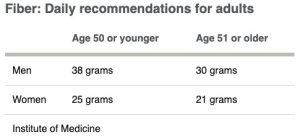Worried about Dementia? Eat More Fiber
This is part of our “In Medical News” series where Dr. Sara Laudani shares a study or article in recent news and offers some analysis and tips about the news, to help patients stay informed.
New research shows that eating a high fiber diet (especially soluble fiber) is linked to a lower risk of disabling dementia. The study of 3700 adults found that participants who consumed the most fiber had approximately a 25% lower risk of developing dementia in later life.
As the researcher pointed out, there are many unknowns and possible factors in dementia and “it is not appropriate to determine causality based on the results of a single cohort study. However, the results of this study can be said to be one of the findings that will lead to the prevention of dementia.”
The Brain-Gut Interaction
Scientists have become more interested in the connection between the brain and the gut. The idea that the central nervous system communicates bidirectionally with the gastrointestinal tract suggests that the gut microbiome may influence brain health. Previous animal studies have shown beneficial effects of fiber on neuroinflammation.
The mechanisms are currently unknown, but the author of this study suggests, “One possibility is that soluble fiber regulates the composition of gut bacteria. This composition may affect neuroinflammation, which plays a role in the onset of dementia.” It is also possible that dietary fiber may help reduce other risk factors for dementia.
Study Methods and Results
Participants in the study in five communities in Japan completed a dietary recall survey somewhere between ages 40-64 and participate in annual health checkups. They were followed on average for almost 20 years to confirm incidents of disabling dementia. “Disabling dementia” was defined as dementia that required care under the National Long-Term Care Insurance System.
The inverse association between fiber intake and dementia was stronger for soluble fiber and was confined to dementia without a history of stroke. The association remained after adjusting for potential factors that might affect dementia onset.
The authors note several limitations. For example, they did not distinguish between Alzheimer’s and non-Alzheimer’s dementia. Additionally, the classification of dietary habits was done via a single survey. More research is also needed to see if similar results are found in other populations.
More Information and Take Aways
What is dietary fiber and where is it?
It is found mainly in fruits, vegetables, whole grains and legumes and is probably best known for its ability to prevent or relieve constipation. But foods containing fiber can provide other health benefits as well, such as helping to maintain a healthy weight, lowering your risk of diabetes, heart disease, and some types of cancer, and keeping your brain functioning well.
There are 2 types:
- Soluble fiber. This type of fiber dissolves in water to form a gel-like material. It can help lower blood cholesterol and glucose levels. Soluble fiber is found in oats, peas, beans, apples, citrus fruits, carrots, barley and psyllium.
- Insoluble fiber. This type of fiber promotes the movement of material through your digestive system and increases stool bulk, so it can be of benefit to those who struggle with constipation or irregular stools. Whole-wheat flour, wheat bran, nuts, beans and many vegetables, such as cauliflower, green beans and potatoes, are good sources of insoluble fiber.
The average American adult’s total daily fiber intake is approximately 15 grams, much lower than recommended.

Picture from https://www.mayoclinic.org/healthy-lifestyle/nutrition-and-healthy-eating/in-depth/fiber/art-20043983
Tips:
- There is growing evidence of the relationship between the brain and the gut. A healthy gut microbiome plays a role in many health issues.
- Be curious and select tasty foods that provide fiber: it isn’t difficult!
- Find out how much dietary fiber you need, the foods that contain it, and how to add them to meals and snacks.

Dr. Sara Laudani offers consultations in internal medicine and functional and nutritional medicine in our clinics. Click here to schedule an appointment with her and find out how her holistic approach and protocols can help you resolve your health issues.
Reference: https://www.medscape.com/viewarticle/969760
